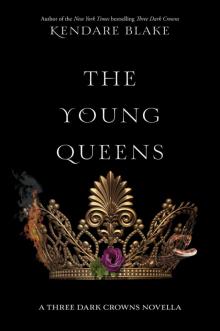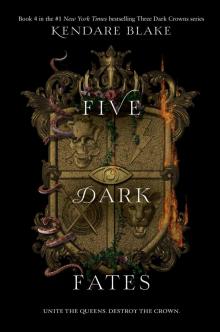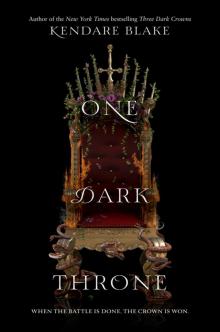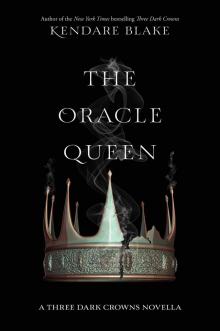- Home
- Kendare Blake
The Oracle Queen
The Oracle Queen Read online
EPIGRAPH
No Sight no sound
No fault was found
No treason to be had
—
Yet every one
Would die that day
For Elsabet, the mad
—From “The Song of the Mad Oracle”
CONTENTS
Cover
Title Page
Epigraph
Prologue
500 Years Ago: The Queen’s Court
The Queen’s Garden
The Black Green
The Queen’s Chamber
The Queen’s Court
Indrid Down
The Queen’s Chamber
Midsummer
The Volroy
Indrid Down
The Festival of Midsummer
The Volroy
Indrid Down
The Volroy
Indrid Down
The Volroy
The Volroy
Prynn
The Volroy
The West Tower
About the Author
Books by Kendare Blake
Back Ad
Copyright
About the Publisher
PROLOGUE
On a warm summer day, Queen Mirabella sat on the front steps of the Black Cottage at Midwife Willa’s feet, having her hair braided. Her little sisters—Queen Arsinoe, younger by mere minutes, and Queen Katharine, younger by a full half hour—played together in the yard.
“It is a good thing that black does not show grass marks,” Willa commented when Katharine tripped over her own feet and tumbled, dark skirt flying.
“Ha ha,” Arsinoe taunted. Katharine’s large eyes began to shine and wobble. Mirabella cleared her throat, and Arsinoe glanced at her guiltily. Then Arsinoe sighed and went to help their youngest sister up.
“Why do you not ever tell them to be nice?” Mirabella asked.
“I tell them to be polite.” Willa separated the little queen’s hair with gentle fingers. “It is so long now. So long and so shiny. When you are queen, you must wear it down often and never cover it with a veil.”
Mirabella fought the urge to jerk her head. Even at five years old, she knew that nice and polite were not the same things, though she could not explain exactly why.
Down in the grass, Arsinoe and Katharine had resumed chasing each other. They laughed breathlessly, and when they ran out of laughter, Katharine began to sing a song that Willa had taught them that morning.
“No Sight, no sound, no fault was found, no treason to be had!”
“Yet every one would die that day for Elsabet the mad!” Arsinoe finished the rhyme and raised a stick she had been carrying as a sword. Katharine squealed and ran.
“Why did you teach us that song?” Mirabella asked. It was a queen’s song, the tale of the last oracle queen, but Mirabella did not like it.
“Everyone on the island knows the story of the mad oracle. A queen certainly should.”
“It is only a song.”
“Songs preserve history. So people remember.” Willa lowered her voice, and Mirabella knew that what would follow was only for her ears. “They say that Queen Elsabet’s gift of sight turned on her. That it drove her mad, until in a fit of paranoia she ordered the execution of three whole houses of people.”
“What is ‘paranoia’?”
“Being afraid of or convinced of something that is not there.”
“Were they sure she was wrong?”
“They were sure. And for her crime, Queen Elsabet spent the last twenty years of her reign locked in the West Tower of the Volroy. And now we will have no more sight-gifted queens.”
Mirabella swallowed. She knew why that was. Because every triplet born with the sight gift was drowned. “All because of her?”
Willa peered around and chuckled at the stark look on Mirabella’s face. “Do not be so troubled! It was a long time ago.”
“How long ago?”
“Long, long ago. Before even the mist came to protect us. Queen Elsabet ruled when Fennbirn was part of the world still. Back then, the ports were crowded with ships from countries like noble Centra, rich Valostra, and warlike Salkades.”
Centra, Valostra, Salkades. Names Mirabella had heard before in Willa’s teachings. But not often. Those names had been lost to the mist. They were all the mainland now. They barely existed.
“Twenty years is a long time to be locked away,” Mirabella murmured, and Willa kissed the top of her head. She felt a tug on the ends of her hair, and a finished braid appeared, tossed over her shoulder.
“Never mind that. Go on now and play.”
Mirabella stood and did as she was told. But for the rest of that day, and many days afterward, she thought about Queen Elsabet and the song of the mad oracle. And she wondered how much of it was true.
500 YEARS AGO
THE QUEEN’S COURT
By midmorning, the Queen’s Court was already a flurry of activity. Foreign ambassadors and representatives from the best families in the capital had begun to gather since the moment the doors had been thrown open. They gathered and chatted, in their best mantles and hats, exchanging news and gossip as they waited for the queen. But the queen was nowhere to be found.
“How long do you think it will be today?” Sonia Beaulin asked as she sat at the long table with the rest of the Black Council, flipping a dagger in one hand and then using her war gift to drive it into the wood.
“Not nearly as long as it will take someone to craft a new table.” The elemental, Catherine Howe, raised her eyebrow at the gouges. “Be patient. You have seen how she governs; she is decisive. She doesn’t need the time that other queens do. And she is still young. Still settling.”
“She’s had three years. And we are a young Black Council. Have we not settled?”
“You were settled to begin with,” Catherine said, and tossed her pretty brown curls.
Beside them, seated at the center of the table between war-gifted Sonia and sight-gifted Gilbert Lermont—the queen’s own foster brother—the poisoner Francesca Arron listened. Arrons were, as a rule, very good at listening. And waiting. And Francesca had waited for three years, since her appointment to the Black Council, to be named as its head.
“The queen arrives! Make way!”
Francesca stood with the others as Queen Elsabet and her party entered the room, their flushed cheeks and boisterous voices brightening it at once, even though the open, pillared walls of the summer court were already bathed in sunlight.
“My apologies for keeping you waiting,” Queen Elsabet announced. She was dressed in hunting clothes, her black skirt loose for riding and edged in dirt. She tugged her hands free of her riding gloves and passed them to her maid with a whisper, and the girl ran, no doubt to return with sweets and savories and good wine. Clever queen, to ply them with treats. Soon her lateness would be forgotten.
She walked through the crowd quickly, her legs long enough that most of her party had to jog to keep pace. All of them except her Commander of Queensguard, of course. War-gifted Rosamund Antere, of the Antere family of warriors, stood a head above even the queen.
“You have been hunting,” Francesca said as Queen Elsabet sat down.
“I have.” Her face still glowed from exertion, and her black eyes glittered. It was almost enough to make her appear beautiful. But not quite.
Sonia Beaulin cleared her throat. “Your attendants said you rode out before dawn.”
“Do you know a better time to hunt for grouse?” Elsabet smiled. “Now, if my council is finished interrogating me about my sport . . .” She turned away toward her subjects, and one by one the Black Council sank to their seats, Francesca the last.
Gilbert Lermont stood and read from his l
edger the names of those who had arrived first, and they stepped forward. The queen listened with rapt attention as they gave her their news: reporting achievements of trade or crops or the birth of a new high-ranking daughter. It was true what Catherine Howe said: the queen was decisive of manner. Her comments were few but earnest. She was clever but spared little time for flattery, of herself or for those she spoke to.
It was a fine enough way to rule, Francesca noted, but it would not endear her to the people at large. And for someone so decisive, she was taking plenty of time to appoint Francesca to her deserved head of council seat.
She watched the queen laugh her throaty laugh, a deep laugh for a queen so young, still a girl, really, at barely twenty. Some said she was handsome, but they were only being kind. Queen Elsabet had an angled nose and a large mouth; she was no beauty. Not that beauty was required in queens, but a beautiful queen was easier to love.
When Elsabet’s laugh turned into a cough and she excused herself from court, Francesca masked a smile. She could wait for her head of council seat. But she would not wait forever.
THE QUEEN’S GARDEN
Later that day, Queen Elsabet, the Oracle Queen, sat in her green rectangular garden on the southwest side of the Volroy castle. She was reclined in a soft chair at a gray stone table, playing cards with her closest companions, shaded from the sun by a black cloth canopy.
“Gilbert, are you going to discard? Or wait until I simply forget what game it is we are playing?”
Gilbert’s thin lips drew together, thinning them still further, as he considered his hand. He lay a card, and she grinned and snatched it up.
“Just what I needed.”
“Blast.” He frowned and tousled his dark gold hair. “I’m out of practice. Few of these fools will take a card game with someone sight-gifted. As if that is how it works.”
“Indeed. One does not need the sight to beat play as bad as yours.” With a light laugh, Elsabet set her winning hand before him on the table.
“Blast.”
She smiled as he gathered up the cards and began to shuffle. Gilbert Lermont was her foster brother; they had grown up together in the white city of Sunpool, and she could count on one hand the number of times he had beaten her at cards. But let him blame it on lack of practice. She knew how he felt, alone in a new city with few other oracles.
“I have been thinking often of home,” she said.
Gilbert glanced at her from beneath his dark eyebrows. So did Bess, her favorite maid and constant companion, and Rosamund Antere, always nearby as her Commander of Queensguard.
“Indrid Down is home now, Elsie.”
Elsabet frowned. “Can one not have two homes? I just . . . I miss being there, before all of this.” She gestured to her head, to the silver crown set with cloudy stones that felt melted to her head. “I miss being near those who know what the sight gift is and how it works. People here look at me like an oddity. And they expect every day at court to be a wonder. As if I ought to be spouting grand prophecy twice in the afternoon and once before breakfast.”
She took up her freshly dealt cards and set them down again when Bess pushed more of Gilbert’s tonic toward her in a cup.
“I do not want any more. It’s bitter.”
“Please,” Bess said. “Your illness worries everyone.”
“It was only a headache. Only dust in my chest from the hunt.” But Elsabet drank the tonic down even if just to see Bess smile. “Besides, they were not worried so much as irritated.”
“Perhaps if you would not arrive late so often,” Gilbert said as he arranged his hand.
“That wouldn’t change a thing. My Black Council does not like me because I do not do things the way they want me to. But weren’t you the one who told me, Gilbert, that I should make my mark as queen the instant I arrived at the Volroy? The moment I took my crown. Weren’t you the one who warned me that young queens are not taken seriously? That it could take years before I was truly the ruler of my island?”
“Was it not also me who warned you that a queen is only as good as her advisers?”
“Yes.” She crooked her mouth at him. “But you were wrong. That may be true of other queens, but an oracle queen is only as good as her gift.”
At the corner of the canopy, ever watchful, Rosamund Antere cocked her head of bloodred hair.
“Rosamund? What is it?”
“Your king-consort approaches.”
Elsabet’s heart thrummed in her chest, and she cursed it silently. She was a queen, not some village girl who could let her heart dictate her behavior. But with William, her king-consort, that was a difficult thing to remember. Every time he walked into a room she held her breath. Every time he looked at her, she wanted to hide her unattractive face behind her hand.
William was from Centra, a country across the seas to the northeast. It boasted a fine army and bountiful croplands. A king-consort from Centra was always a politically savvy selection. Though to tell the truth, Elsabet would have chosen William even if he had come from nothing.
Other suitors had been handsome. All of them, actually. And several had been dashing. But none of them looked at Elsabet the way William had. No one in her whole life had looked at her like that. Like she was beautiful. Desirable. And certainly no one as attractive as he was, with his bright blue eyes and midnight hair. When they were courting, he used to say that on the throne their black hair would make them as finely matched as a set of carriage horses.
He entered the canopy and one of Elsabet’s attendants quickly brought him a seat. Though it was probably a waste of time. William never stayed in one place for long. He was a man of sport. It had been at his insistence that they rose before dawn to hunt for grouse that morning.
He bent and kissed the queen’s cheek, but when she frowned, he turned her face and kissed her lips instead. “These are for you.” He set a bundle of wildflowers on the tabletop, pretty blooms of pink and white and yellow, their stems cut evenly by his dagger and tied with a length of striped ribbon.
“I picked them from the riverbank near where I was swimming,” he said as Elsabet sniffed, and indeed, the cloth around his collar was still wet.
Elsabet fingered the ribbon. It was an expensive adornment, a new fashion that she had seen many of the daughters from well-gifted families wearing.
“Where did you get the ribbon?” she asked, and William swallowed. “Did you go by the market?”
“Yes! I couldn’t very well present you with a loose bundle.”
Elsabet tried to smile. She gestured to the cards. “Shall we deal you in?”
“No.” William chewed his lip. “I crave some music. I think I’ll go and secure us a few musicians.” Then he was gone, with no more than a glance, and Elsabet half rose out of her chair to follow him. But he did not disappear completely. He lingered in the garden, chatting with a few of the people who had gathered near the queen’s party in small conversational parties of their own. Elsabet’s throat tightened as he touched the chin of a very pretty elemental girl with a bright blond bun.
“You know he has always been flirtatious,” Gilbert said quietly. “That was one of the qualities that drew you to him when he was only a suitor.”
Elsabet tore her eyes away from William and forced herself to play a card. “Gilbert, does your sight gift now extend to mind reading?”
“No, my queen.”
“I didn’t think so.” Gilbert’s gift was for visions in smoke, along with the uncanny ability to find things he sought, that manifested in a near-trance state and caused him to sway strangely back and forth. His sight gift did not extend to hearing the thoughts of others or sensing their emotions. Her gift did not extend to that either, and she was glad of it.
Forcing herself to ignore William, Elsabet leaned back to look up at the grandness of the castle. Or rather, the grandness that was to come. The great fortress of the Volroy had been under construction for a hundred years, and still the heights of the towers were not complet
e. For a hundred years, black stone had made its way across the island, over land and down river and around the sea to Bardon Harbor. A hundred years and countless changes of master builders and craftsmen and laborers. But under Elsabet, it would be finished. She knew it, because she had seen it. In the same vision that showed her she would best her sisters and become the Queen Crowned. She saw herself in a vision wandering the rooms of the completed West Tower, with a crown upon her head.
“There will be black spires atop them soon,” she said, and Bess followed her gaze upward. “Did you know, Bess, that it was the war queen, Aethiel, who began construction of the Volroy?”
“I know it,” Gilbert answered before Bess could reply. “Aethiel began it, and elemental Elo, the fire breather, continued it, and so did our last queen, the warrior Emmeline.”
“Of course you know that.” Elsabet shoved him playfully to knock the smugness out of his expression. “You are a historian. But make sure the commonfolk know it, too, will you? I think they are beginning to resent the expense.”
“Your reign is bound to be less expensive than those of the war queens,” Gilbert said, “with their constant raids and battles.”
At the mention of war, Rosamund spoke quickly, surprising them all that she had been bothering to listen. “The people understand war. They understand its costs. Its glory.” She shrugged. “And the spoils don’t hurt either.”
“Would you have me be a war queen, then, Rosamund?”
Rosamund turned her head and regarded the queen with steady green eyes. She smiled. “I would not have you be anything but what you are.”
“Good.” Elsabet smiled back, her gaze flitting past William, who was returning with his found musicians. “Because the time of the war queens is over. Now we shall have peace. The island has earned it.”
THE BLACK GREEN
In the summer months, it was not uncommon for the queen to hold court or entertain guests outdoors. She favored the garden known as the Black Green, a rectangular space bordered by hedges and a stone wall on the north, with soft, cropped green grass and few trees. Wide, gravel paths cut through from every corner and converged at a dark stone fountain. Inevitably, one of the foreigners would quip that the Black Green was not very black, and the queen would reply that they could not very well call it “the Green Green.” Everyone would laugh, and Francesca Arron would ball her hands into fists. Most people, even most of the Black Council, found the outdoor courts rather pleasant. But to Francesca Arron, it was yet another way that Elsabet bucked tradition.

 Anna Dressed in Blood
Anna Dressed in Blood The Young Queens
The Young Queens Queens of Fennbirn
Queens of Fennbirn Antigoddess
Antigoddess The Dogs of Athens
The Dogs of Athens Ungodly
Ungodly Mortal Gods
Mortal Gods Five Dark Fates
Five Dark Fates Girl of Nightmares
Girl of Nightmares One Dark Throne
One Dark Throne Two Dark Reigns
Two Dark Reigns The Oracle Queen
The Oracle Queen Antigoddess gw-1
Antigoddess gw-1